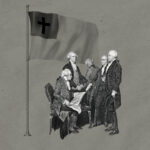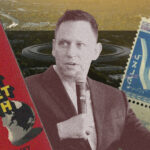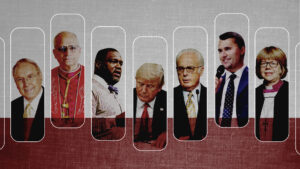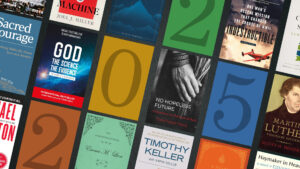Some readers may think this is a defense of TGC. While it’s true that TGC is subjected to this type of pseudo-event on a near daily basis, it’s a problem that is undermining evangelicalism as a whole. Also, this cynical phenomena is an issue I’ve been complaining about for at least 10 years—long before I joined TGC.
Did you hear about the outrageous comment by a prominent Christian?
A well-known (infamous?) pastor, media figure, and former politician called for the assassination of the president of a foreign nation. Within hours the comment was on every newscast and the main topic on social media. Hundreds of people called for Christian leaders to denounce the pastor—and complained when the denunciations didn’t come quickly enough.
If you’re wondering how you missed this “news” it’s because it didn’t happen today. It occurred ten years ago when Christian broadcaster Pat Robertson’s called for the assassination of Venezuelan President Hugo Chavez on his TV show, The 700 Club.
At the time it was the most talked about issue of the day—and only for a day. What was deemed so important that it monopolized the entire nation’s attention for 24-hours was considered unworthy of discussion a mere few days later. Chances are even if you were one of the ones outraged at the time that you likely don’t remember it at all. The reason you don’t remember it is because even at the time it wasn’t really newsworthy.
But we’ve become such insatiable consumers of the media that even when there is no news to report, the new product must be, as late historian Daniel Boorstin explained, created:
Then came round-the-clock media. The news gap soon became so narrow that in order to have additional “news” for each new edition or each new broadcast it was necessary to plan in advance the stages by which any available news would be unveiled. After the weekly and the daily came the “extras” and the numerous regular editions. The Philadelphia Evening Bulletin soon had seven editions a day. No rest for the newsman. With more space to fill, he had to fill it ever more quickly. In order to justify the numerous editions, it was increasingly necessary that the news constantly change or at least seem to change. With radio on the air continuously during waking hours, the reporters’ problems became still more acute. News every hour on the hour, and sometimes on the half hour. Programs interrupted any time for special bulletins. How to avoid deadly repetition, the appearance that nothing was happening, that news gatherers were asleep, or that competitors were more alert? As the costs of printing and then of broadcasting increased, it became financially necessary to keep the presses always at work and the TV screen always busy. Pressures toward the making of pseudo-events became ever stronger. News gathering turned into news making.
If you find Boorstin’s observation rather banal and obvious, keep in mind that he wrote this statement in 1961.
Over the past 54 years, the news cycle has accelerated to a breakneck speed. Not only do we have 24-hour news channels, we have Twitter and Facebook, blogs and RSS feeds, and we can get up-to-the-minute coverage of the most trivial non-events at any time and any place through our smartphones.
Because there is not enough news to fill our insatiable demand, the media (including social media) feasts on what Boorstin refers to as pseudo-events:
A pseudo-event, then, is a happening that possesses the following characteristics:
(1) It is not spontaneous, but comes about because someone has planned, planted, or incited it. Typically, it is not a train wreck or an earthquake, but an interview.
(2) It is planted primarily (not always exclusively) for the immediate purpose of being reported or reproduced. Therefore, its occurrence is arranged for the convenience of the reporting or reproducing media. Its success is measured by how widely it is reported. Time relations in it are commonly fictitious or factitious; the announcement is given out in advance “for future release” and written as if the event had occurred in the past. The question, “Is it real?” is less important than, “Is it newsworthy?”
(3) Its relation to the underlying reality of the situation is ambiguous. Its interest arises largely from this very ambiguity. Concerning a pseudo-event the question, “What does it mean?” has a new dimension. While the news interest in a train wreck is in what happened and in the real consequences, the interest in an interview is always, in a sense, in whether it really happened and in what might have been the motives. Did the statement really mean what it said? Without some of this ambiguity a pseudo-event cannot be very interesting.
(4) Usually it is intended to be a self-fulfilling prophecy. The hotel’s 30th-anniversary celebration, by saying that the hotel is a distinguished institution, actually makes it one.
One of the most common types of pseudo-events is the opinion poll. News agencies used to report on opinion polls; now they sponsor polls them so they can report on the very poll they sponsored. Instead of reporting the news, they create a pseudo-event to report on. Ironically, this information (the opinion poll) is processed as “news” and helps shape the judgment of people who are supposed to be represented by the polls.
For example, if you’re told that the President’s approval rating is 95 percent, then you are more likely to also approve of the job he is doing. Likewise, if his rating is low, then your opinion about his performance is also likely to be low. If you take a contrary view then you will be the one who is put on the defensive—even if your opinion is based on a weighing of relevant facts and evidence.
The media, politicians, or public figures create most pseudo-events. But the advent of social media has allowed the common man to get in on the act.
A prime example is the “call to denunciation.”
Not all calls to denounce the comments or actions of a public figure are cynical and unwarranted, of course. You can usually tell which are genuine because they tend to be broad and generic (e.g., “All people of goodwill should denounce such violent rhetoric.”) They tend to become “pseudo-events,” though, when they share certain characteristics:
(1) Person A calls for Person/Group B to denounce Person/Group C—although A has no personal relationship to either B or C.
(2) B has no real connection to C, other than both being members of a large, generic group (e.g., Muslims, evangelicals).
(3) The addition of a time element (e.g., “It’s been three whole hours and B hasn’t yet publicly denounced C!”).
(4) A isn’t as interested in the comments or actions of C as in trying to find a reason to criticize B.
Search through your social media and you’ll find examples of this trend. On just about any given day someone in your social media circle is complaining because Pastor X or Organization Y didn’t denounce a comment made by some pastor they have no association with or some politician they would never, ever vote for. In the age of instant media, it’s not enough to simply be our brother’s keeper. Now, we must also be their round-the-clock, always-on-call denunciator too.
The problem is not that we notice pseudo-events or that we occasionally comment on them. The problem is that we evangelicals appear to share the culture’s addiction to pseudo-events and social media outrage. If you’re enaged in the practice every single day or week then you should really ask yourself, Is this incessant focus on daily trivia the best use of my God-given time and energy?
As Christians, we’re expected to take an eternal perspective, viewing events not just in their historical context but also in their eschatological context. But we can’t do that while focusing on the pseudo-events and social media outrages of the last 24 hours. We can’t keep an eye on what is important while we are furiously scripting our reactions to pseudo-events that will be forgotten within a week.
Truly important events are not always captured on the front page of a daily paper or found in your social media feed. As Malcolm Muggeridge, himself a journalist, admitted:
I’ve often thought that if I’d been a journalist in the Holy Land at the time of our Lord’s ministry, I should have spent my time looking into what was happening in Herod’s court. I’d be wanting to sign Salome for her exclusive memoirs, and finding out what Pilate was up to, and—I would have missed completely the most important event there ever was.
Download your free Christmas playlist by TGC editor Brett McCracken!
 It’s that time of year, when the world falls in love—with Christmas music! If you’re ready to immerse yourself in the sounds of the season, we’ve got a brand-new playlist for you. The Gospel Coalition’s free 2025 Christmas playlist is full of joyful, festive, and nostalgic songs to help you celebrate the sweetness of this sacred season.
It’s that time of year, when the world falls in love—with Christmas music! If you’re ready to immerse yourself in the sounds of the season, we’ve got a brand-new playlist for you. The Gospel Coalition’s free 2025 Christmas playlist is full of joyful, festive, and nostalgic songs to help you celebrate the sweetness of this sacred season.
The 75 songs on this playlist are all recordings from at least 20 years ago—most of them from further back in the 1950s and 1960s. Each song has been thoughtfully selected by TGC Arts & Culture Editor Brett McCracken to cultivate a fun but meaningful mix of vintage Christmas vibes.
To start listening to this free resource, simply click below to receive your link to the private playlist on Spotify or Apple Music.


































